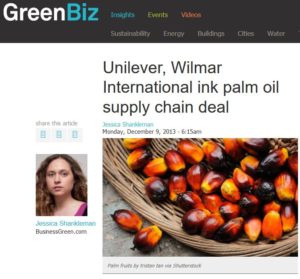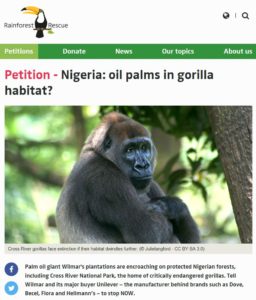The case material in this training e-module is adapted from a real e-module that we used in the last years in the lecture “Corporate Sustainability” at ETH Zurich’s Department of Management, Technology and Economics. It contains a video, case reading material, and a writing assignment.
10.1 – Unilever: Committing to sustainability
Please watch the video by Unilever’s CEO Paul Polman. It is a typical example for a CEO interview on a company’s sustainability efforts. Listen carefully and with consideration and take some notes.
10.2 – Critical Voices about Unilever
The case deals with Sustainability in Unilever’s Supply Chain Management. Read the following material before continuing to the writing assignment.
10.2.1 – Unilever, Wilmar International ink palm oil supply chain deal[1]

One of the world’s largest agri-businesses has pledged to end deforestation throughout its supply chain, in a move that represents a major step forward for companies seeking to source sustainable palm oil, soya beans and sugar.
Wilmar International yesterday signed a deal with consumer goods giant Unilever, which has promised that 100 percent of the palm oil used in its supply chain would by fully traceable by the end of 2014.
As Wilmar controls 45 percent of the world’s palm oil market, supplying other household brands such as Procter and Gamble, Mondelez and Reckitt Benckiser, it has faced huge pressure from NGOs and businesses to develop more environmentally and socially sustainable practices.
The company has already taken steps to preserve high conservation value forests and peatland on its own concessions, although campaigners have been quick to point out that deal covers just a sliver of the palm oil it trades.
A report by Greenpeace earlier this year accused Wilmar of trading with companies that deforest areas illegally, set fire to peatland and clear areas known to be used as habitats for tigers.
But the new policy aims to establish mechanisms to help Wilmar monitor activities among its subsidies and third-party suppliers, to ensure it can halt deforestation across the supply chain.
“We believe that the palm oil industry can provide a sustainable and affordable source of vegetable oil to meet rising global demand for responsible products,” said Wilmar chairman and chief executive Kuok Khoon Hong, in a statement.
“We can produce palm oil in a way that protects forests, clean air and local communities, all while contributing to development and prosperity in palm oil growing regions. We know from our customers and other stakeholders that there is a strong and rapidly growing demand for traceable, deforestation-free palm oil, and we intend to meet it as a core element of our growth strategy.”
Luigi Sigismondi, Unilever’s chief supply chain officer, said he was truly impressed by the commitment and urged other suppliers to follow suit.
“Unilever firmly believes that it is only through constructive dialogue and close cooperation that we can lead the transformation of the industry,” he said.
“Wilmar, as our strategic partner in palm oil, is clearly committed – with us – to accelerating the much-needed sustainable market transformation and to helping us achieve transparent, traceable and certified palm oil supply chains.”
The policies were developed with consultancy The Forest Trust (TFT), which already works with a number of agri-businesses to help them reduce the environmental impact of their operations and supply chains, such as Asia Pulp and Paper as well as consumer facing businesses like Nestle.
TFT executive director Scott Poynton said he expected the new deal to transform the palm oil industry.
“Few companies dominate their sectors the way Wilmar dominates palm oil,” he said.
“[This] announcement… dwarfs in ambition any previous joint commitment in the sector and raises the bar for responsible global agricultural production. We commend Wilmar for its strong new policy, and now is the time for transparent and verifiable implementation.”
10.2.2 – Unilever and Palm Oil
On 11 December 2014, Unilever announced it was suspending future purchases from palm oil supplier PT Smart. The move followed allegations that the Indonesian company’s plantations are contributing to the destruction of high conservation value forests and expanding onto peat lands.
What’s being said:
“Unilever’s decision could represent a defining moment for the palm oil industry. What we’re seeing here is the world’s largest buyer of palm oil using its financial muscle to sanction suppliers who are destroying rainforests and clearing peat lands. This has set a new standard for others to follow.” – Greenpeace Executive Director John Sauven.
“The Greenpeace claims are of a nature that we can’t ignore. Unilever is committed to sustainable sourcing.” – Unilever’s Chief Procurement Officer Marc Engel.
“If companies sign up to the Roundtable on Sustainable Palm Oil [RSPO], we expect them to live up to the RSPO principles.” – Unilever’s Director of Sustainable Agriculture and President of the RSPO Jan-Kees Vis.
Key facts about palm oil:
- Palm oil is used in many products, from shampoo, lotions and soap, to margarines, sauces and ice cream.
- Every consumer goods company in the world, from big producers like Unilever to those that produce supermarket-own brands, use palm oil.
- Unilever is a founder member of the RSPO, which it chairs. There is currently comparatively little palm oil which is certified sustainable. The RSPO is working to increase the amount available and has set sustainability criteria against which suppliers can now be certified. The RSPO is the only organisation in the world to do this.
- Unilever has purchased 80% of the sustainable palm oil certificates made available in the market, which means Unilever buys the majority of certified sustainable palm oil as it becomes available.
- Unilever works directly – and through the RSPO – with local NGOs and agencies – especially with Greenpeace – to drive industry change and set high sustainability standards. Few companies are doing as much as Unilever to find a solution, a fact that Greenpeace acknowledges.
- Unilever is committed to the highest sustainability and environmental practices. When Greenpeace presented us with its report on palm oil producer PT Smart, we acted immediately.
- Deforestation is a serious issue and has a bigger impact on carbon emissions than the whole transport sector. It is a problem that requires action and leadership from governments, companies and NGOs working in partnership. No one group can find the answer by itself. Unilever is committed to playing an active role.
10.2.3 – Rainforest Rescue Campaign[2]

10.2.4 – Rainforest Rescue’s Petition Letter[3]
To: the boards of Wilmar and Unilever
Ladies and Gentlemen,
The forests of Cross River State in Nigeria are a hotspot of biodiversity and home to the Cross River gorilla, the most critically endangered primate in Africa. Furthermore, thousands of villagers in the region live sustainably from the harvests of their small plots.
This is now at risk because of Wilmar’s current massive expansion of its plantations. Satellite images show that deforestation, which has accelerated across all of Wilmar’s Nigerian holdings since 2011, is encroaching on protected areas such as Cross River National Park and Ekinta River Forest Reserve.
The Nigerian NGO Environmental Rights Action and Friends of the Earth have published a detailed study with maps, satellite images and photos documenting the destruction.
In 2013, Wilmar proclaimed a “no deforestation, no peat, no exploitation” policy. By all appearances, that was an empty promise.
We call on Wilmar to cease its deforestation in Nigeria immediately. We also call on Unilever to stop being an accessory to rainforest destruction by sourcing palm oil from Wilmar.
10.3 – 6SA Writing Assignment
6SA Writing Assignment
Imagine you are working in the Unilever Sustainable Business Team. More than 6.000 signed letters from the Rainforest Rescue Campaign have arrived in your office. You have been asked to evaluate the situation for the Unilever CEO Paul Polman. You have seen in the video that the CEO is committed to Unilever’s sustainability efforts.
Formulate your personal position as a member of the Unilever Sustainable Business Team to the Unilever CEO. Write your argument with the 6SA method.
We suggest that you craft your argument by hand first before writing it down. Carefully edit your argument for clarity to avoid misunderstandings and spell-check your writing to avoid typos. When you are done, save your file locally and copy-paste your 6SA text into peergrade.
Submissions of 6SAs and peer reviews happen on peergrade.io.
- Source: http://www.greenbiz.com/blog/2013/12/09/unilever-wilmar-international-ink-palm-oil-supply-chain-deal Aug 8th 2017 ↵
- Source: https://www.rainforest-rescue.org/petitions/1007/nigeria-oil-palms-in-gorilla-habitat Aug 8th 2017. ↵
- Source: https://www.rainforest-rescue.org/petitions/1007/nigeria-oil-palms-in-gorilla-habitat Aug 8th 2017. ↵
